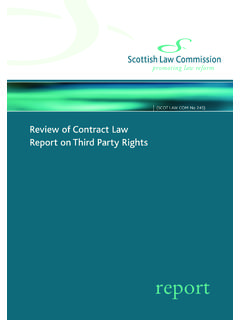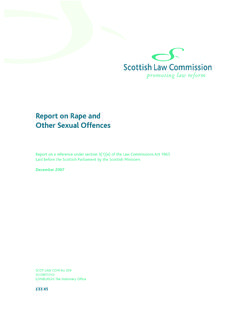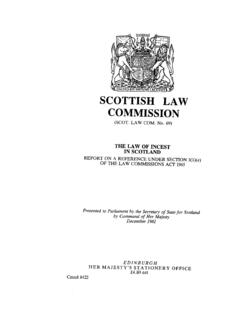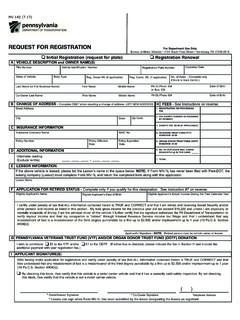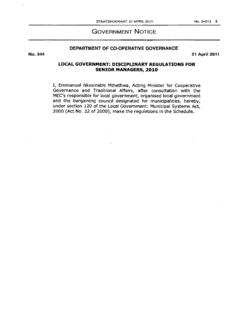Transcription of Remedies for Breach of Contract DP 109
1 SCOTTISH LAW COMMISSION. Discussion Paper No 109. Discussion Paper on Remedies for Breach of Contract April 1999. This Discussion Paper is published for comment and criticism and does not represent the final views of the Scottish Law Commission The Commission would be grateful if comments on this discussion paper were submitted by 16 July 1999. Comments may be made on all or any of the matters raised in the paper. All correspondence should be addressed to: Mrs Gillian B Swanson Scottish Law Commission 140 Causewayside Edinburgh EH9 1PR. Tel: 0131 668 2131. Fax: 0131 662 4900. E-mail: NOTES. 1. In writing a later report on this subject, the Commission may find it useful to be able to refer to, and attribute, comments submitted in response to this paper.
2 If no request for confidentiality is made, the Commission will assume that comments on the paper may be used in this way. 2. Those who wish a copy of this paper for the purpose of commenting on it should contact the Commission at the above address. ii Contents Paragraph Page PART 1 - INTRODUCTION. Background to discussion paper 1. Scope of discussion paper 1. Matters covered 1. Matters not covered 2. Nature of discussion paper 2. Strategy for reform 2. Earlier work of the Law Commissions 2. International models 3. Terminology 3. Acknowledgements 5. PART 2 - Remedies FOR Breach IN GENERAL. What is Breach ? 6. Anticipatory Breach 7. Repudiation 7. Anticipated material Breach 8. Anticipatory Breach of severable part of Contract 8.
3 Material Breach 9. Importance and nature of concept 9. Is terminology satisfactory? 9. Options 9. International models 10. Assessment 11. Request for views 11. The structure of Remedies 11. The relationship between the Remedies 12. The position of the Contract breaker 13. A general discretionary control? 14. PART 3 - suspension OF PERFORMANCE. Nature of the remedy 16. Existing law 17. Criticisms of existing law 18. Can there be suspension in response to anticipated Breach ? 18. Can there be suspension in response to a non-material Breach ? 18. Danger of abuse 19. iii PART 4 RESCISSION. Nature of the remedy 21. Need for the remedy 21. Intimation to party in Breach 21. Rescission for remediable Breach 22.
4 The question 22. The concept of remediable Breach 23. Existing law 23. Assessment 25. International models 27. Request for views 28. Loss of right to rescind 29. By lapse of time 29. By waiver or personal bar 29. By tender of performance 30. Prospective effect of rescission 30. Existing law 30. International models 31. No need for change 31. Redressing economic imbalances after rescission 31. Nature of the problem 31. Existing law 33. Assessment 36. Leave to the law on unjustified enrichment? 38. International models 39. Request for views 40. PART 5 DECREE FOR PAYMENT. Nature of the remedy 42. Definition 42. Assessment of existing law 42. Payment for unwanted performance 43. The existing law 43.
5 Criticism 45. Options for reform 45. International models 46. Assessment and request for views 47. Deduction of rectification costs 47. The problem 47. The existing law 47. Criticism 48. Options for reform 48. Request for views 49. iv PART 6 SPECIFIC IMPLEMENT. Nature of the remedy 50. When will specific implement be refused? 50. Decree sought not sufficiently precise 50. Performance not possible 51. Performance would be of a highly personal nature 51. Replacement performance readily available 51. Decree could not be enforced 51. Enforcement would cause exceptional hardship or injustice 51. Interim remedy 51. International models 52. Assessment 52. Request for views 53. PART 7 INTERDICT. Nature of interdict 54.
6 Scope of discussion 54. The law reform question 54. Positive and negative interdicts 54. Interdicts which bring about positive results 55. The modern case law 56. Criticisms of the existing law 59. Proposal for reform 59. PART 8 DAMAGES. Nature of the remedy 61. Types of loss or harm 62. Loss of what was contracted for 63. Other loss or harm 63. Existing law on compensatable loss or harm 64. Remoteness 65. The present law 65. International models 67. Assessment 67. Request for views 68. Non-patrimonial loss or harm 68. The question 68. Existing law 69. International models 70. Assessment 70. Request for views 70. Damages based on the "reliance interest" 71. The question 71. English law 71. v Scottish law 72.
7 International models 72. Is there a problem? 73. Assessment 73. Request for views 74. Unreasonable rectification costs 74. The problem 74. The swimming pool case 74. Scottish law 75. Assessment 76. Request for views 76. Damages for loss or harm to third parties 76. The problem 77. Some possible solutions under the existing law 78. Assessment 79. Request for views 80. PART 9 REDUCING UNCERTAINTY. Introduction 81. Requiring adequate assurance of performance 81. An ultimatum procedure 82. A summary declarator procedure 83. Using replacement transaction as a basis for damages 83. Using current market price as the basis of damages 84. PART 10 MISCELLANEOUS. Interest 86. Loss or harm attributable to aggrieved party 87.
8 General request for views 90. PART 11 SUMMARY OF PROPOSITIONS AND QUESTIONS 91. vi . Gloag, Contract W M Gloag, The Law of Contract (2nd edn, Edinburgh, 1929). McBryde, Contract W M McBryde, The Law of Contract in Scotland (Edinburgh, 1987). McGregor, Code H McGregor, Contract Code: Drawn up on behalf of the English Law Commission (Milan, 1993). European Principles The Principles of European Contract Law (Part I: Performance, Non-performance and Remedies ), Prepared by the Commission on European Contract Law (Chairman, Professor Ole Lando) (Dordrecht, 1995). Schlechtriem P Schlechtriem, Commentary on the UN Convention on the International Sale of Goods (CISG) translated by G Thomas (2nd edn (in translation), Oxford, 1998).
9 Stair Memorial Encyclopaedia The Laws of Scotland: Stair Memorial Encyclopaedia (25 volumes; Edinburgh, 1987-96). Treitel, Contract G H Treitel, The Law of Contract (9th edn, London, 1995). Unidroit Principles Principles of International Commercial Contracts (UNIDROIT, Rome, 1994). US Restatement American Law Institute, Restatement of the Law Second, Contracts 2d (St Paul, Minn., 1981). Vienna Convention The United Nations Convention on Contracts for the International Sale of Goods (adopted at Vienna, April 1980). Walker, Contracts D M Walker, The Law of Contracts and Related Obligations in Scotland (3rd edn, Edinburgh, 1995). vii Part 1 Introduction 1. Background to discussion paper Many thousands of contracts are entered into every day in Scotland.
10 They are not all performed according to their terms. Often discussions and negotiations can resolve matters. Sometimes the Contract will itself provide some mechanism for resolving disputes. But in many cases the difficulties caused by Breach of Contract cannot be resolved informally. The 1. law has to provide a range of Remedies to enable the party aggrieved by the Breach to obtain either the performance contracted for or some compensation for not receiving it. In the absence of such Remedies one of the most basic of legal principles - that contracts must be kept - would be legally unsupported. Problems of Breach of Contract are by no means 2. confined to large commercial contracts. They can affect anybody.

